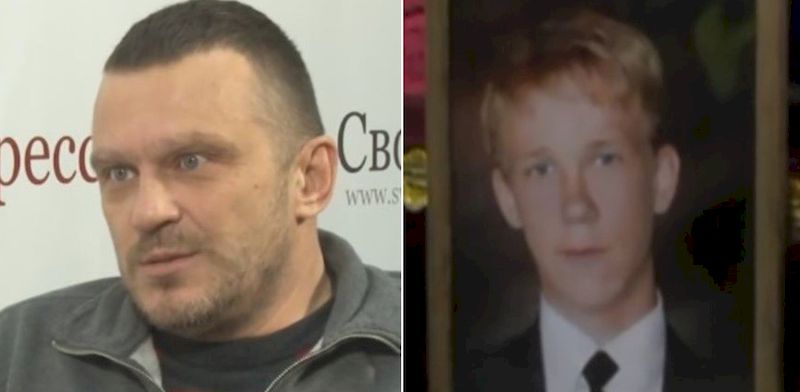Panic among Donbas militants as Russia arrests ex-fighter suspected of the horrific killing of a pro-Ukrainian teenager

A former Donbas militant leader, Vadim Pogodin has been arrested in Russian-occupied Crimea on an extradition request from Ukraine who accuses him of direct involvement in the torture and killing of 16-year-old pro-Ukrainian and football-loving Stepan Chubenko. The move is unprecedented, and has clearly worried many other militants, who fear they could be next.
Even given Russia’s invasion of Crimea and undeclared warfare in eastern Ukraine, an extradition treaty remains in place and there is no excuse for not extraditing Pogodin to face trial in Ukraine. That does not mean he will be arrested, since Moscow may well fear the information Pogodin can provide about war crimes in general, and about a person directly implicated in the downing of MH17 in particular.
46-year-old Pogodin was arrested on June 20 after Interpol issued a red notice on him at Ukraine’s request. He was remanded in custody by a Yalta court the following day, and is currently in the Simferopol SIZO, or remand prison.
Pogodin is suspected of crimes committed in the summer of 2014, when he and his so-called ‘Kerch battalion’ were in Donetsk. His role in those events is undisputed, and he was shown on Russian television together with Alexander Zakharchenko, now leader of the so-called ‘Donetsk people’s republic’ [DPR], the day before the storming of Donetsk Airport.
Although it is former militant comrades who began indignantly shouting about Pogodin’s arrest on social media, the news of his arrest was of particular concern for Stepan Chubenko’s mother, Stalina. She told Donbas.Realii about her son, and about the past three years spent seeking justice over his horrific killing.
The Kramatorsk teacher describes how “three burly and armed men shot a tortured, unarmed 16-year-old boy, whom they’d tied up with the T-shirt he played football in over his head. During the exhumation, I saw my child with his hands bound with scotch tape”.
Stepan’s parents had understood he was in danger because of his pro-Ukrainian views, and sent him to Kyiv when Sloviansk and neighbouring Kramatorsk were seized by former Russian military intelligence officer Igor Strelkov and his heavily armed men. They had thought if safe for him to return after Kramatorsk was liberated in July 2014. It would have been, but Stepan tried to get home through Donetsk and was seized because of his blue and yellow Ukrainian ribbon and scarf from the Karpaty football club which he supported.
The investigation has concluded that the lad was murdered by ‘Kerch’ fighters, with Pogodin having been directly involved in the killing.
It is the Ukrainian authorities who are seeking Pogodin’s extradition, however it sounds as though the militants have also established his role in the killing. Novosti Donbassa reports that back in 2015, Roman Manekin, who supports the militants, posted photos of documents which assert that it was Pogodin who ordered Stepan’s murder. The charges against him could carry a life sentence.
Ukrainian hackers have broken into correspondence between the militants in 2014 that suggest Pogodin was also involved in other crimes, including looting and murder.
The ‘outrage’ expressed by militants and by several Russian MPs is over the possible extradition of Pogodin to Ukraine, not over the strong grounds for suspecting him of involvement in the torture and murder of a pro-Ukrainian, football-loving 16-year-old.
The militants are worried for themselves, of course, understanding that this is a precedent that could place them in danger. Unfortunately, many of the people accused of grave war crimes are Russian citizens, and Russia never extradites its own, regardless of the crimes they are suspected of having committed.
It remains unclear whether Russia will in fact extradite Pogodin, and the problem is not only in difficulties for Ukraine which cannot have any direct dealings with the illegal occupation regime in Crimea.
Pogodin simply knows too much, including, quite possibly, about the downing by Russian or pro-Russian fighters of the Malaysian airliner MH17 over militant-controlled Donbas on July 17, 2014. Although there is nothing to directly link Pogodin with this clear war crime, he does have links with Sergei Dubinsky, the Russian military man known as ‘Khmury’ whose voice was intercepted by the Ukrainian Security Service and who is believed to have been directly involved in transporting the Russian Buk surface-to-air missile system which killed 298 passengers.





